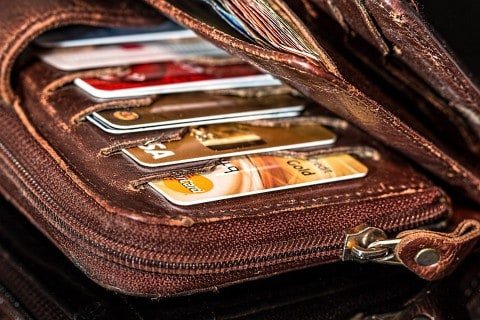What Happens When You Default on Your Credit Card (and What to Do About It)

Am I the only one who irrationally fears some kind of radical financial trashfire befalling me? Some days, I check my bank accounts, loan accounts, credit card statements, and my PayPal account two to three times EACH because I have this general sense of foreboding. There are advantages of working in the personal finance sphere — I’m much more informed, savvy, and knowledgeable about my money and my place in the general economy — but it also means I’m very familiar with all the ways you can screw yourself over, financially speaking. There have been a few times I’ve made really silly mistakes which have cost me more money, in the form of late fees, tickets, and surcharges (to name a few). But overall, my deeply embedded sense of fear for smirching my credit score in the slightest has kept me mostly out of trouble. Mostly.
However, some fears still persist, and chief among them is that I’ll suddenly remember an old credit card I had run up a balance on during my youth, and subsequently forgot about it. In attempt to address the (sometimes irrational) fear of ever finding myself in a position where I would default on my credit card debt, I would unpack the process of what it looks like step-by-step. When I feel knowledgeable about potential, scary financial situations, and I’m no longer in the dark about what “could” or “might” happen, it makes me feel infinitely better. I feel more equipped to not only advise myself on the situation, but to also serve as a potential source of information for friends who might be experiencing financial difficulty. (Chelsea actually wrote about her experience dealing with it here.)
So, without further ado, here are the four basic steps in the credit-card-default process so you have a deeper understanding of it, but hopefully never experience it first-hand.
What Does it Actually Mean to Default?
To understand how the process starts, we’ll start at the very beginning. Once you charge items on your credit card, you’re required to pay a monthly (typically, but not always) payment to service the debt to the card, and pay back that loaned money. The problem begins if you fail to pay that debt off. This might happen for any number of reasons — losing a job, running out of an emergency fund, dealing with an unexpected life event, etc. — but failing to make a payment for a certain number of days means you’ve defaulted on that loan. According to this article on Nerd Wallet, they explain defaulting further, saying:
After you’ve failed to make a payment on your credit card for 180 days, your issuer assumes you’re probably never going to. At this point, the issuer can (and usually does) close your card, write off what you owe as bad debt and sell your account to a collections agency.
Throughout that 180-day period (although it might differ depending on your creditor; for example, 90 days), your credit score might drop as a result of your inactivity and failure to pay being reported to the credit bureaus. Once the bank finally closes your card and decides you are no longer going to pay your debt, your credit score will be affected and drop even further.
Who Owns Your Debt?
Once you’ve actually defaulted on your debt, it moves on to the second stage, where the debt may be transferred to a new lender of record. This part confused me a bit at first because I always assumed one’s debt remained at their bank. Not necessarily true! Understanding who is responsible for handling the money you owe is essential to knowing how the entire system works and who plays what part.
Once you’ve defaulted on your credit card debt, your card will be closed by your bank. At this point, if the credit card issuer chooses to no longer be part of the collection process, your debt may be sold to someone else — usually “debt buyers.” Why do banks do this, you may ask? It’s a way for banks to get bad loans off their books and allows them to quickly realize a guaranteed amount rather than spending the time and resources pursuing a debt they may never actually collect. For the buyers, it’s an opportunity for them to buy your loan for a fraction of the cost and potentially collect the whole amount.
Note that this process is not automatic, and the debt is only sold if the banks choose to sell it as they face a set of pros and cons related to this decision. Also, collection agencies (which more people might be familiar with) and buyers are not the same; agencies provide third-party collection services, whereas buyers actually purchase debt and may employ agencies to help them collect it.
This well-written article on Clearpoint explains the process of buying and selling debt. According to Clearpoint, “The FTC found that debt is sold for an average of 4.0 cents per dollar of debt face value.” The collection agencies then try to recoup the debt in-full in order to make a profit.
Now What?
Once you’ve defaulted on a credit card loan, there are few different paths you can take to resolve outstanding debt:
— Pay it off. This is, in my humble opinion, the best way to ensure that you can move on from such a serious snafu and begin rebuilding your credit and financial health. If you can afford to pay off the debt completely, do it. There are a few tips and best practices to consider when paying off debt with a collection agency. It’s important to note that as a best practice, you should ask for documentation that proves the debt is in fact yours (which collection agencies are legally required to provide). In some cases, there are administrative errors on the debt, settled debt that remains reported as outstanding, etc. You can read even more details about the process here.
— Settle the debt. This is another great solution for people who might not have the funds to make such a payment, but still want to work to pay it off. You can try and settle the debt for a smaller number by calling to negotiate with the collection agency. This fantastic article on Bank Rate explains this further saying, “Before you call to negotiate, I strongly recommend you know what you can realistically afford to pay per month or in a lump sum. If you negotiate a payment for less than the full amount owed, be sure to get the payment agreement in writing from the collector before you send in any payment.”
— Do nothing (yikes). Some people recommend waiting out the seven-year period and not paying the debt. However, even if you wait the seven-year period for your debt to drop off of your account, it might still never truly be gone. According to the previously-linked article on Bank Rate, “The Fair Credit Reporting Act (or FCRA) rules apply only to the reporting life of a debt, not the collecting life span,” which means that there are no limitations on how long collection agencies can try and obtain payment for the loan “outside of the courts after the statute of limitations date.” It might not be as easy as you think to simply ignore your debt and wait it out until it “doesn’t matter anymore.”
— Declare bankruptcy (an extreme solution). If you do this, you’ll have this grave financial mistake on your credit report for the next 10 years before moving on. There’s so much more to learn and understand before making this kind of choice, which one shouldn’t take lightly. To read more about it, read the articles linked here: understanding what it is, how to contextualize the decision, how to start the process, and how you can start to grasp the inevitable repercussions that result from it. Declaring bankruptcy might affect your future assets, credit score, ability to secure loans/mortgages, etc., and it’s a decision that should not be taken lightly.
How Long Will a Default Stay on Your Credit Report?
Seven years. Defaulting on your credit card is the kind of financial mistake that will do lasting damage because it appears on your credit report for a good chunk of time. That means if you were to make a mistake like this when you’re in college, at say 18 or 19 years old, the repercussion of it will follow you until your mid-to-late twenties. This lasting damage might thwart your attempts to potentially secure a car loan, qualify for an apartment lease, or qualify for a home mortgage. It’s easy to see how a few silly choices and/or mistakes we make in our youth can affect the options available to our future-selves.
This article is not exhaustive and there is still a lot to learn, so it’s essential to read more about this topic for yourself. While it’s not impossible to come back after defaulting on credit card debt, it does take time. It’s important to do everything in your power to avoid this happening. However, if you are experiencing this yourself or know someone going through, hopefully this article can be a resource for you to try and get back on your feet, and to a place of complete financial health.
Last modified on January 11th, 2017







Show Comments +